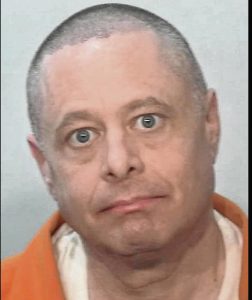By Áine Cain and Kevin Greenlee | The Murder Sheet
For the Daily Journal
DELPHI, Ind. — The prosecution’s case against Delphi murders defendant Richard Allen moved along briskly Wednesday and Thursday, with jurors hearing testimony from a forensic pathologist, top case investigators and eyewitnesses.
The state is in the process of attempting to “box in” the defendant by convincing the jury that he was the “Bridge Guy” who victim Liberty German captured on video on her phone on Feb. 13, 2017. That footage — cleaned up and shown to jurors Thursday — showed a man in a blue jacket and jeans lumbering toward victim Abigail Williams on the bridge. Searchers found the girls the following day in the woods. One girl was nude. The other was wearing her friend’s clothes. Their throats had been cut.
Carroll County Sheriff Tony Liggett, who said on Thursday that he has listened to the video hundreds of times, told jurors his interpretation of the exchange between the girls and Bridge Guy.
Pursued across the Monon High Bridge by a man, Williams was said to have told German, “Don’t leave me up here.”
“That be a gun,” German replied.
When the Bridge Guy addressed the girls as “guys,” they replied, “hi.”

Then he ordered them, “Down the hill.” Liggett testified that he could hear a gun racking — the video included a metallic sound — but that was stricken from the record after the defense objected.
The Delphi murders case has attracted extensive international attention from interested members of the public and online conspiracy theorists alike. Prosecutors do not have DNA evidence or a murder weapon. Their case chiefly relies on Allen’s own admissions, ballistics evidence, and a surveillance video from a Delphi store that shows a vehicle similar to Allen’s 2016 Ford Focus — complete with rims that purportedly matched his — driving toward the trails at the time he claimed to have been arriving there.
So far, the state has presented three eyewitnesses who placed “Bridge Guy” on the trail near the Freedom Bridge and on the first platform of the bridge, matching Allen’s statements to authorities. Another witness said she saw Bridge Guy shuffling around the road later in the afternoon, covered in mud and blood. All of these glimpses were too brief or far away to allow the witnesses to identify the specific person they saw. That is where Allen’s own statements come in. He claimed to have arrived on the trails at 1:30 p.m. and to have passed a group of girls. He also claimed to have hiked onto the first platform of the Monon High Bridge to watch fish. In his account, he did not notice much during his walk on the trails, because he was occupied with a stock ticker on his phone.
On the stand Thursday, Liggett said Allen’s claim about the stock ticker was “interesting” given there is no evidence that the defendant’s phone was present on the trails that day. In response to defense attorney Brad Rozzi’s questions about whether or not Liggett once believed that more than one suspect could have committed the murders, the sheriff replied, “Prior to Richard Allen, I was open to anything. That is part of being a good investigator.”
Later that day, Indiana State Police Detective David Vido said that investigators seized numerous electronic devices, including 23 phones, from the Allen residence. The defendant’s phone from 2017 was missing.
Investigators testified that no data exists on the extant phones directly linking Allen to either victim. After the murders, he is said to have done web searches pertaining to the crime.
Forensic pathologist Roland Kohr took the stand Wednesday. He performed the autopsy on both girls. Deputy prosecutor James Luttrell clicked through numerous slides of autopsy photographs, showing that Williams died of a wound to her neck. She also had unaccounted for lines on her face around her mouth, although her skin bore no evidence of tape adhesive. Meanwhile, German suffered four wounds to her throat.
Kohr testified that certain injuries to German’s neck could have come from a boxcutter with a thumb guard. According to the state in pre-trial hearings, Allen confessed to killing the victims with a box cutter. The jury has not yet heard any of the defendant’s 61 confessions.
After years of speculation, the prosecution revealed the mistake that delayed Allen becoming a suspect in the case. When the defendant called in a tip saying that he was on the trails of Delphi when the kidnapping happened, his name was mistakenly listed as Richard Allen Whiteman. Allen lived on Whiteman Drive at that time. That mistake went uncorrected even after Indiana Department of Natural Resources Captain Daniel Dulin attempted to correct it in the paperwork after following up with Allen and conducting an initial interview with the man. Allen’s story only resurfaced in 2022, after volunteer Kathy Shank — a retired longtime Department of Child Services official — uncovered it while organizing files. Shank took the file to Liggett, who said that he was struck that it aligned with the accounts of a group of young girls who had seen Bridge Guy.
Investigators also spoke of Allen’s other strange statements that occurred while his house was being searched. The search in Allen’s home produced his Sig Sauer gun, which prosecutors say ejected a round at the crime scene, and many box cutters and other blades.
During the search, Indiana State Police Lt. Jerry Holeman said he approached Allen to let him know that investigators would try not to damage or disrupt his home. If Allen noticed damage, he could file a specific form and receive compensation.
“For the most part, he was really quiet,” Holeman said.
Holeman testified that Allen told him:
“It doesn’t matter. It’s over.” He repeated the phrase later after Holeman offered to drive Allen to see his wife Kathy, who had left the premises to go to the restroom at her workplace.
Defense attorney Andrew Baldwin — whose Criminal Defense Team firm is headquartered on Franklin — countered on cross that Allen might have been simply embarrassed that his neighbors would know his house was being searched by police.
The Murder Sheet is a podcast that takes a journalistic and analytical approach to true crime coverage. They are partnering with the Daily Journal to provide coverage of the Delphi double-murder trial. Check out their podcast at murdersheetpodcast.com.





